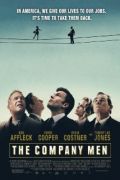
Directed by
John Wells
104 minutes
Rated MA
Reviewed by
Sharon Hurst

The Company Men
Synopsis: GTX is a successful transport and manufacturing conglomerate in which Bobby (Ben Affleck) holds a high-flying position. Phil (Chris Cooper) started years ago on the ship-building floor and has worked his way up to managerial level. Gene (Tommy Lee Jones) is second in command at the company, which he founded with his long term friend, CEO Jim Salinger (Craig T Nelson). When the Great Financial Crisis hits, Salinger starts to restructure and downsize and Bobby, Gene and Phil are forced to reassess every aspect of their lives as workers, fathers and husbands.What a wonderful companion piece this is to the recent documentary, Inside Job. Whereas the former gives the facts, The Company Men tells us, with real emotion, about the human costs of the GFC.
Everything about this film debut from a much-lauded TV writer (ER, West Wing) John Wells impressed me, from the brisk evocative opening scenes in which we are introduced to the three main characters and the lives of upper level managers – glossy, smug and secure. But then in a boardroom meeting we learn of the company’s financial challenges and so the scene is set for what becomes an unfolding nightmare for the three men.
The downsizing soon spreads through GTX like a virus, extending from the lower-levels of the company right up to managerial level. And while workers are losing jobs left, right and centre, the CEO Salinger is doing what bosses do – taking home millions, shuffling share deals, and building new, expensively-appointed offices. Meantime, even high-level employees like Gene, Bobby and Phil now face a nightmare of lifestyles they can no longer keep up and how to face their families and friends under these new circumstances. This is real life stuff, and how the men fight to retain their dignity and overcome their situations is beautifully played out in different ways for each of them.
Many themes of immediate relevance are examined, particularly that of lives being built on over-geared debt and distorted expectations. We see Phil’s daughter hoping for a school trip to Italy, Gene’s opulent mansion-like house and demanding wife, and Bobby’s lifestyle which is propped up by endless credit cards and lines of debt. Isn’t this all too familiar to many people with today’s “aspirational” lifestyle, focussed on money, appearances and prestige?
Director-writer Wells has a deep sympathy and compassion for his characters and this translates to the screen. I found myself really caring for these flawed, struggling men and the depth of emotion in the three leads’ performances was enough to bring me close to tears on several occasions. Affleck just gets better with age. The arc of Bobby’s emotions, from anger, arrogance, denial, through to the humbling changes that he undergoes is thoughtfully portrayed. Jones, who I used to perceive as a tough guy, again shows what feeling lurks under his rugged exterior; Gene is a man of integrity prepared to oppose decisions by Salinger, which Gene perceives as neither ethical nor in the interests of the workers. Cooper is heartbreaking as Phil, who can’t understand how he could have had such a hands-on career come to nothing. Kevin Costner is there too, in a wonderful small role as Bobby’s brother, Jack, a blue-collar builder, who really throws into relief the contrast between his world and that of the corporate man. Maria Bello gives a strong and nuanced performance as GTX’s HR hatchet-woman Sally, while Rosemarie de Witt is memorable as Bobby’s wife, Maggie, who is as supportive a wife as any man could hope for.
Although the film's ending is over-determined by Hollywood's unshakeable requirement for a tidy resolution, The Company Men could inspire anyone who feels life has overwhelmed them to see what opportunities can be found in adversity, while reminding us of the dangers of a world where economic concerns too often are seen as more important than basic humanity. A cautionary tale with lots of heart and some of the best acting in a mainstream film that we’ve seen in a long time.

Want more about this film?


Want something different?




